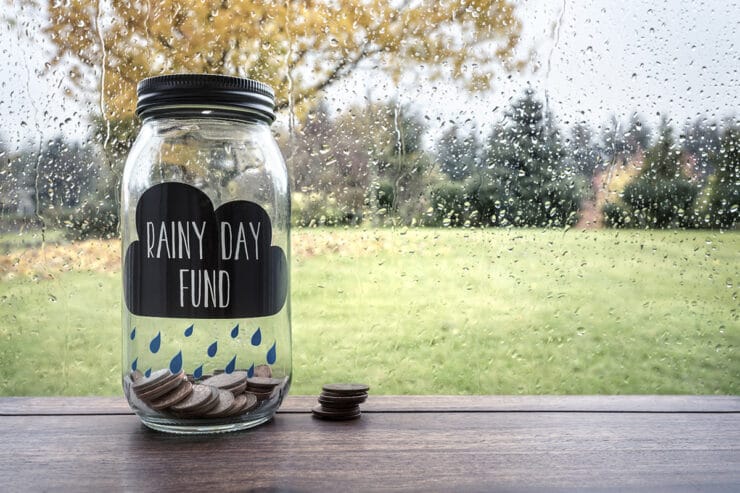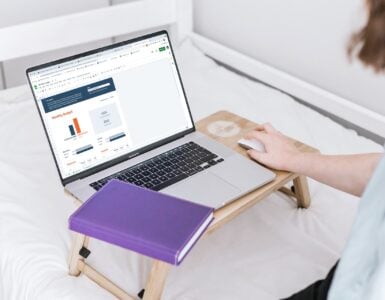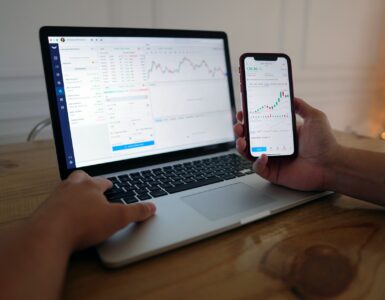The future is unpredictable. Sickness or illness, car maintenance, home repairs, or job loss. Unfortunately, you can never really know what’s around the corner. It’s, therefore, best to be as prepared as possible, which you can do by setting up an emergency fund.
An emergency fund will ensure that you always have some extra cash up your sleeve if need it.
Although it seems pretty obvious that some money put away is a good idea it’s easier said than done, right?
Maybe you’re already operating on a tight budget. So how in the world are you going to manage to pay all your monthly expenses…
…and still have some to spare cash left over to put away into an emergency fund?
Well, that’s what we are going to cover here. Read on to find out.
How Much Should I Save?
Let’s start by first covering how much you should aim to save. Although this is different for everyone, the right amount really depends on your own personal financial circumstances. Even so, try working off this rule of thumb: save three to six months’ worth of living expenses.
Why?
Well, for instance, if you happen to lose your job you’ll have enough cash stashed away that you should have ample time to find more work. Sounds good in theory, right? But how?
Follow the below steps.
1. Set Up An Account Separate To Your Everyday Account
Before you start putting money aside to build an emergency fund, it’s a good idea to set up a separate savings account. An account that isn’t to be used as everyday spendings account. Preferably something that offers a good return of interest on the funds that you are putting away.
Not only is a savings account a good way to make your money work for you, by accruing interest over time, but it also a great way to eliminate any temptation you may have to spend the money you are trying to save.
By having the money elsewhere, you will be less likely to go on a spending spree and blow all your hard-earned cash.
2. Set Yourself A Monthly Savings Goal
The next step or strategy is to set a savings goal while sticking to it as closely as possible. By doing so, you’ll begin to form good financial habits which will make the task at hand seem much less daunting.
An excellent way to put away enough money is to set up an automatic transfer. Do this by predetermining an amount of money you’d like to save and then set up an automatic deposit.
And the best time to deposit money into this account?
The same day your wage is paid. That way, you won’t even notice the money is gone, leaving the rest of your wage to pay for other expenses.
You can also set yourself a monthly budget by spending category using the Emma app and we’ll let you know when you are spending too fast.
3. Utilize Your Offset Account
If you have a home loan with an offset account, why not use it as an emergency fund? That way, not only are you putting money away for a rainy day but you are also saving money on your home loan’s interest payments.
Utilizing your offset account will also allow easy access to the money you have put away, offering faster access compared to most saving accounts.
4. Stash Any Unexpected Windfalls
Another great way to build an emergency fund quickly is to stash any windfalls that may come your way. A tax refund that brings in more money than previously expected, a rebate check, or even a very generous birthday present can seriously help to build your emergency fund in no time at all.
I understand that it’s super tempting to just dash out and splash this cash, however, since you weren’t counting this money into your monthly budget, you likely won’t miss it at all.
5. Pull Out The Calculator And Slash Your Budget
We are all guilty of spending money unnecessarily. Therefore, ask yourself this question: Are there areas of my budget I can tighten up?
I’m sure there is.
I mean, do you really need all those streaming services? And is it super necessary to eat out so often? Probably not, right?
Every bit of cash that you can slash from your monthly budget allows you more money to stick into your emergency fund. This doesn’t mean you can’t spoil yourself; it simply means that perhaps you don’t need to do this in the same way you are currently.
I mean, there are plenty of other ways to treat yourself.
Try cooking yourself a really thought out and well-prepared meal at home, maybe grab yourself a bottle of wine and head to the beach rather than drinking at your local bar, or perhaps wait for a deal or sale on any newly released video games, music, or movies, rather than rushing out on release and overspending where you don’t need to.
6. Make Your Money Work For You
If you have decided to set up a savings account for your emergency fund, it’s a good idea to ensure this account is a high-yield savings account, money market account, or certificate of deposit account (CD).
By doing so, the money you have put into this account will begin to grow all by itself. This will start slowly, to begin with. However, every dollar counts, and before you know it your return of interest will be very healthy.
Wrap Up
Now you should have a few ideas on how to get started building your emergency fund.
Another great way to start saving money is to employ the services of Emma.
Emma is a money management app that has been developed to help you achieve financial freedom.
Emma will help you take control of your finances, keep your unnecessary purchases in check, and highlight any areas of your budget that you could be tightened up.
The sooner you are able to do this, the quicker you’ll have a very decent sized emergency fund stashed away for a rainy day.
Emma is available for download on both the App Store and Google Play Store.







[…] Starting an emergency fund is just one thing Coronavirus has taught us about money. If you’d like to read more about starting an emergency fund, read our article here. […]
[…] We’ve written about emergency funds in more detail, here. […]
[…] is why it is crucial to have an emergency fund you can dip into when needed and only invest money you won’t be needing in the near term (next […]
[…] a financial buffer for when times get tough; such as a loss of income or unexpected costs arising. Emergency funds are essential in times of uncertainty, times like now when a global pandemic is causing economic […]